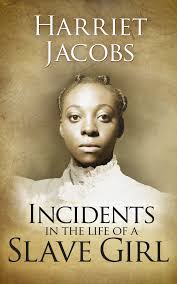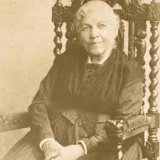Incidents in the Life of a Slave Girl Page #5
Incidents in the Life of a Slave Girl, written by herself is an autobiography by Harriet Jacobs, a mother and fugitive slave, published in 1861 by L. Maria Child, who edited the book for its author. Jacobs used the pseudonym Linda Brent.
It is easy to find out, on that day, who clothes and feeds his slaves well; for he is surrounded by a crowd, begging, "Please, massa, hire me this year. I will work very hard, massa." If a slave is unwilling to go with his new master, he is whipped, or locked up in jail, until he consents to go, and promises not to run away during the year. Should he chance to change his mind, thinking it justifiable to violate an extorted promise, woe unto him if he is caught! The whip is used till the blood flows at his feet; and his stiffened limbs are put in chains, to be dragged in the field for days and days! If he lives until the next year, perhaps the same man will hire him again, without even giving him an opportunity of going to the hiring-ground. After those for hire are disposed of, those for sale are called up. O, you happy free women, contrast your New Year's day with that of the poor bond-woman! With you it is a pleasant season, and the light of the day is blessed. Friendly wishes meet you every where, and gifts are showered upon you. Even hearts that have been estranged from you soften at this season, and lips that have been silent echo back, "I wish you a happy New Year." Children bring their little offerings, and raise their rosy lips for a caress. They are your own, and no hand but that of death can take them from you. But to the slave mother New Year's day comes laden with peculiar sorrows. She sits on her cold cabin floor, watching the children who may all be torn from her the next morning; and often does she wish that she and they might die before the day dawns. She may be an ignorant creature, degraded by the system that has brutalized her from childhood; but she has a mother's instincts, and is capable of feeling a mother's agonies. On one of these sale days, I saw a mother lead seven children to the auction-block. She knew that some of them would be taken from her; but they took all. The children were sold to a slave-trader, and their mother was bought by a man in her own town. Before night her children were all far away. She begged the trader to tell her where he intended to take them; this he refused to do. How could he, when he knew he would sell them, one by one, wherever he could command the highest price? I met that mother in the street, and her wild, haggard face lives to-day in my mind. She wrung her hands in anguish, and exclaimed, "Gone! All gone! Why don't God kill me?" I had no words wherewith to comfort her. Instances of this kind are of daily, yea, of hourly occurrence. Slaveholders have a method, peculiar to their institution, of getting rid of old slaves, whose lives have been worn out in their service. I knew an old woman, who for seventy years faithfully served her master. She had become almost helpless, from hard labor and disease. Her owners moved to Alabama, and the old black woman was left to be sold to any body who would give twenty dollars for her. IV. The Slave Who Dared To Feel Like A Man. Two years had passed since I entered Dr. Flint's family, and those years had brought much of the knowledge that comes from experience, though they had afforded little opportunity for any other kinds of knowledge. My grandmother had, as much as possible, been a mother to her orphan grandchildren. By perseverance and unwearied industry, she was now mistress of a snug little home, surrounded with the necessaries of life. She would have been happy could her children have shared them with her. There remained but three children and two grandchildren, all slaves. Most earnestly did she strive to make us feel that it was the will of God: that He had seen fit to place us under such circumstances; and though it seemed hard, we ought to pray for contentment. It was a beautiful faith, coming from a mother who could not call her children her own. But I, and Benjamin, her youngest boy, condemned it. We reasoned that it was much more the will of God that we should be situated as she was. We longed for a home like hers. There we always found sweet balsam for our troubles. She was so loving, so sympathizing! She always met us with a smile, and listened with patience to all our sorrows. She spoke so hopefully, that unconsciously the clouds gave place to sunshine. There was a grand big oven there, too, that baked bread and nice things for the town, and we knew there was always a choice bit in store for us. But, alas! Even the charms of the old oven failed to reconcile us to our hard lot. Benjamin was now a tall, handsome lad, strongly and gracefully made, and with a spirit too bold and daring for a slave. My brother William, now twelve years old, had the same aversion to the word master that he had when he was an urchin of seven years. I was his confidant. He came to me with all his troubles. I remember one instance in particular. It was on a lovely spring morning, and when I marked the sunlight dancing here and there, its beauty seemed to mock my sadness. For my master, whose restless, craving, vicious nature roved about day and night, seeking whom to devour, had just left me, with stinging, scorching words; words that scathed ear and brain like fire. O, how I despised him! I thought how glad I should be, if some day when he walked the earth, it would open and swallow him up, and disencumber the world of a plague. When he told me that I was made for his use, made to obey his command in every thing; that I was nothing but a slave, whose will must and should surrender to his, never before had my puny arm felt half so strong. So deeply was I absorbed in painful reflections afterwards, that I neither saw nor heard the entrance of any one, till the voice of William sounded close beside me. "Linda," said he, "what makes you look so sad? I love you. O, Linda, isn't this a bad world? Every body seems so cross and unhappy. I wish I had died when poor father did." I told him that every body was not cross, or unhappy; that those who had pleasant homes, and kind friends, and who were not afraid to love them, were happy. But we, who were slave-children, without father or mother, could not expect to be happy. We must be good; perhaps that would bring us contentment. "Yes," he said, "I try to be good; but what's the use? They are all the time troubling me." Then he proceeded to relate his afternoon's difficulty with young master Nicholas. It seemed that the brother of master Nicholas had pleased himself with making up stories about William. Master Nicholas said he should be flogged, and he would do it. Whereupon he went to work; but William fought bravely, and the young master, finding he was getting the better of him, undertook to tie his hands behind him. He failed in that likewise. By dint of kicking and fisting, William came out of the skirmish none the worse for a few scratches.
Translation
Translate and read this book in other languages:
Select another language:
- - Select -
- 简体中文 (Chinese - Simplified)
- 繁體中文 (Chinese - Traditional)
- Español (Spanish)
- Esperanto (Esperanto)
- 日本語 (Japanese)
- Português (Portuguese)
- Deutsch (German)
- العربية (Arabic)
- Français (French)
- Русский (Russian)
- ಕನ್ನಡ (Kannada)
- 한국어 (Korean)
- עברית (Hebrew)
- Gaeilge (Irish)
- Українська (Ukrainian)
- اردو (Urdu)
- Magyar (Hungarian)
- मानक हिन्दी (Hindi)
- Indonesia (Indonesian)
- Italiano (Italian)
- தமிழ் (Tamil)
- Türkçe (Turkish)
- తెలుగు (Telugu)
- ภาษาไทย (Thai)
- Tiếng Việt (Vietnamese)
- Čeština (Czech)
- Polski (Polish)
- Bahasa Indonesia (Indonesian)
- Românește (Romanian)
- Nederlands (Dutch)
- Ελληνικά (Greek)
- Latinum (Latin)
- Svenska (Swedish)
- Dansk (Danish)
- Suomi (Finnish)
- فارسی (Persian)
- ייִדיש (Yiddish)
- հայերեն (Armenian)
- Norsk (Norwegian)
- English (English)
Citation
Use the citation below to add this book to your bibliography:
Style:MLAChicagoAPA
"Incidents in the Life of a Slave Girl Books." Literature.com. STANDS4 LLC, 2025. Web. 23 Feb. 2025. <https://www.literature.com/book/incidents_in_the_life_of_a_slave_girl_947>.








Discuss this Incidents in the Life of a Slave Girl book with the community:
Report Comment
We're doing our best to make sure our content is useful, accurate and safe.
If by any chance you spot an inappropriate comment while navigating through our website please use this form to let us know, and we'll take care of it shortly.
Attachment
You need to be logged in to favorite.
Log In